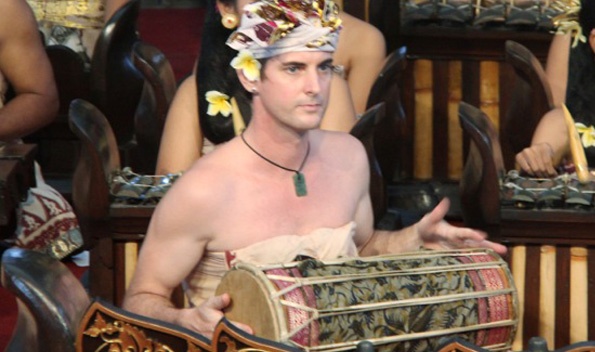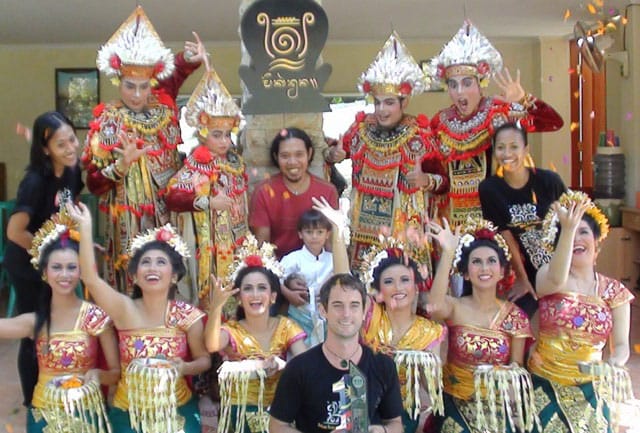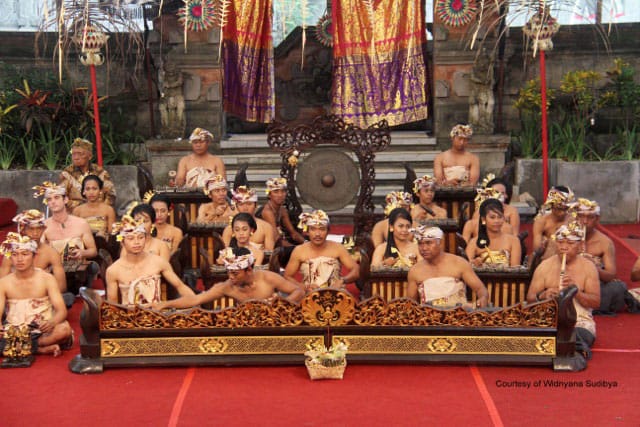Vaughan Hatch was born and grew up in Wellington, New Zealand. At university he majored in Japanese language (Victoria University) and archaeology (Otago University), and also studied ethnomusicology. In 2008 he earned a diploma in publishing and editing from the New Zealand Institute of Business Studies.Vaughan originally came to Bali in 1997 on an Indonesian government scholarship to study Balinese gamelan. He has now spent about half of his life in Bali.
How did you first become interested in Bali?
I’ve been interested in Asian culture and philosophy since I was a teenager. On a whim, while studying at Otago University, I joined a Javanese gamelan group. I instantly fell in love with the sounds of the gongs and the whole concept of mass musical teamwork that embodies a traditional gamelan ensemble. I then started listening to vintage records of gamelan music from all over Indonesia and became mesmerized by the sounds of the old gender wayang, pelegongan, semar pegulingan orchestras. I remember endless university bus rides listening to this ethereal music on my Walkman and dreaming of one day experiencing it live in Bali.
When was your first trip to Indonesia?
I visited Bali and Jakarta as a tourist with my family in 1991 but only for a few days. It wasn’t until I got an Indonesian government scholarship to study at STSI in Denpasar that I could experience the ‘real’ Bali. During these years I spent a lot of my time in villages learning old styles of semara pagulingan from elderly guru, many of whom have now died.
What is the mission of the Mekar Bhuana Conservatory?
To document, reconstruct and archive rare and previously extinct Balinese gamelan music and dance. It is a documentation center that is currently run out of our house rather than a school or an academy.
Has Mekar Bhuana saved any musical forms from extinction?
Four village and court styles of semara pagulingan, two styles of semara patangian and two styles of gender wayang. Semara pagulingan court music dating from the 14th-17th centuries is both profoundly beautiful and has great stylistic variations from village to village. I am fascinated by rare archaic music (10th -14th centuries) such as selonding and gambang.
How does Mekar Bhuana reconstruct music?
We use a variety of sources: working with elderly/senior musicians, learning from vintage or field recordings, and analysing old manuscripts.
What workshops does Mekar Bhuana offer?
Most of our workshop programs are focused on gamelan music and dance, where students have a chance to learn and play on genuine antique Balinese gamelan orchestras. However, we also custom make cultural immersion programs, which may include puppetry, batik, cooking, Balinese language and offering-making components. We have short programs for groups that just wish to study for a half or full day, as well as those which may be several weeks long. We can also include cultural excursions, accommodation and performances depending on a group’s needs. People of all ages have taken our workshops, with the eldest being 85 – composers from New York.
What are the most popular of your private gamelan and dance lessons?
Both gamelan and dance, but currently private dance classes. More people are realizing that Balinese dance is not only fascinating to learn but also a great workout. Typically, students who are familiar with belly dancing or ballet, for example, find that they use completely different muscles and need to think entirely differently about their bodies when they learn Balinese dance. Gamelan workshops are also popular because more and more people want to make music in a community where people of all different musical levels can create something as a whole that is a true collaborative expression of art, where each part of the puzzle, no matter how simple (the gong, for example) is essential and equally important.
How is the organization financed? Is it non-profit?
We currently are self-financed by our online store, www.mekarbhuana.com where we sell products related to Balinese gamelan and dance such as instruments, dance costumes, puppets, masks, recordings, books and other merchandise.
Does Mekar Bhuana receive any local, regional or national government support?
Though we have applied on numerous occasions for funding, we’ve never received any support from the government other than the opportunity to perform at the Bali Arts Festival. Corruption is still a huge barrier to funding for the arts, and still requires that you know the right people to get ‘support’ (particularly around election time), and we don’t play that game.
What other activities are you engaged in besides giving dance and music lessons?
We do performances, both locally and internationally. We give seminars at festivals and conferences domestically and internationally. We have toured four countries, and were privately invited to represent Indonesia at the 2010 Asian Games in Guangzhou. We offer in depth, non-touristic workshops for serious study groups. For the next three months, we will be teaching artists in residence at the University of Toronto.
What future plans does Mekar Bhuana have?
To build organically on our current concept, continuing to help these rare and undervalued art forms blossom once again first in Bali and then across the world. Ultimately we aim to create a documentation center and interactive museum, akin to those you would find in progressive countries, that is fully funded and has both local and international support and patronage. There’s nothing like this anywhere in Indonesia even though such centers are desperately needed.This is not just about helping local people to find out more about rare and extinct art forms but also to increase worldwide awareness about the incredible diversity and uniqueness of Balinese culture.For the next three months, together with my wife, Putu Evie Suyadnyani, I will represent Mekar Bhuana as World Music Artist in Residence at Toronto University. Here we will be spreading the Mekar Bhuana message and teaching rare Balinese court music and dance.
How may interested readers learn more about Mekar Bhuana?
Contact us on info@balimusicanddance.com or via our social networks; Facebok, Twitter, LinkedIn, Pinterest, Google+, under ‘Mekar Bhuana’. We can also be contacted by phone on (0361) 464 201 and 081-999-191-104.






